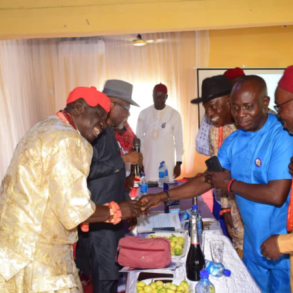The echoes of the hunger protests will likely last longer than expected. As long as the issues which fed the mild social convulsions are not addressed in a holistic manner to confine them to history, so will the tragic imports continue to reverberate beyond this season. The government at the centre is apparently not too bothered about the reverberation of those concerns triggered by its thoughtless policies and lack of initiatives to stave off a disruption which it earlier got wind of.
Rather, Tinubu is exhibiting the traits of an aspiring autocrat given his overt preoccupation with ways he can procure endorsement of his administration’s policies from critical segments of the society. It’s immaterial whether the perspectives of those persons are genuine or merely pretentious provided their envisaged standpoints would contrast sharply with the widespread disenchantment of the citizenry. It’s a compelling path he has to tread in the light of his dismal performance in office.
Quite surprisingly, it didn’t take long before he realized that wish as though its genuineness compelled its approbation by the divine authority of his own religion. Of course, Tinubu has accomplished a major harvest in that regard with the passage of a vote of confidence on his administration by the Council of State. That he summoned the meeting of a foremost advisory body barely a week after the end of the recent protests against his government is very understandable. His resort to that emergency parley was circumstantial, ostensibly to counter his poor rating by Nigerians.
Despite the indignation of Nigerians with the outcome of Council of State meeting and its unjustified commendation of President Tinubu, the body cannot be blamed for taking that position. As it were, members of that body are insulated from the suffering and hardship in the land. One can only speak about poverty if he has had an encounter with it in its most horrendous form. From former Presidents and Heads of State, erstwhile Senate Presidents and Speakers of the House of Representatives to the sitting Governors of the 36 states and retired Chief Justices of Nigeria, none is as impoverished as the majority of Nigerians that are virtually hungry.
Let’s get it very clear. The Council of State is made up of a lucky, privileged group of Nigerians. In our clime, nobody occupies those offices and returns home relatively poor or a bit richer than the proverbial church rat. Whoever does that might be denied his origin by his kith and kin in his ancestral home! So, while in office, they cash in on the peculiar Nigerian factor to help themselves through diverse ways and means of enlightened self-interest. Save for a negligible few, most of our compatriots in this group are either obsessed or afflicted with some virus that breeds avarice which not only verges on primitivity but also numbs our sense of propriety.
Even when they are out of office, they still retain their privileged status and live very comfortably. Except the former heads of the National Assembly, the others are entitled to life pension with numerous privileges and perks that ordinary citizens could only fantasise or fitfully dream about. Yet, it’s neither absurd nor unconscionable for this class of people luxuriating in largely unearned wealth in a vast country wracked by privations and poverty to express their collective view in the manner they did. The stratification of our society makes it so.
What the Council of State did was a demonstration of solidarity with an incumbent who in the next three years or seven years at most, will join them as an ex-office holder. There’s no compunction whatsoever; all that matters is to preserve the group’s interest, identity, loyalty, and support to each member at all times. Whoever wish that the Council had acted otherwise probably does not fully understand the basis of existence of the body. As an advisory organ, it’s not expected to criticize or rail against the policies of an incumbent administration. A retrospective analysis of their meetings and proceedings shows that their outcomes routinely took on the colouration of typical Nigerian movies in which the end is mostly known from the beginning.
Perhaps, the action of these eminent Nigerians is partly rooted in Gregory’s Constructivist Theory of Perception in which the British psychologist argues that information alone is not enough to account for perception. He sees perception as an active process that involves making references and interpretations based on previous knowledge, experience, and context. Gregory’s viewpoint differs from Gibson’s because of his proposition that our perception is more of an interpretation of what we see, with profound influence by our past experiences or our mood.
Flowing from the above, no objective analysis of the state of the country would have been carried out during the meeting for obvious reasons. We could not have expected either Dr. Goodluck Jonathan or Major-General Muhammadu Buhari (retd) who were physically present or Ex-Generals Yakubu Gowon and Abdusalami Abubakar who joined virtually to differ with the position already articulated by President Tinubu as the convener of the meeting. After all, Tinubu and his predecessors are united by a shared tenor of purblind governance. Granted, Tinubu has performed so badly, but they cannot extricate themselves from the sorry state that Nigeria is in. If they had provided remarkable leadership during their tenures, the incumbent would have probably been firmer rather than wobble so pitiably after inheriting a precarious country.
As far as discerning Nigerians are concerned, the opinion of the Council of State meeting is self-serving and diametrically distanced from the loud complaints in the country. The truth is that Nigeria is enmeshed in the worst economic crisis in decades and only the application of appropriate solutions to mitigate hardship and hunger holds a better promise than the President’s recourse to sycophantic acclamation as exemplified by the Council of State’s position. The best advice to Tinubu is that he should act in the best interest of the people in order not to imperil the remainder of his tenure.
Tony Eke, a journalist, based in Asaba, can be reached via tonek6819@gmail.com or 08035504896 (text only).








